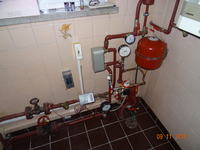FAQ
TL;DR: For many Polish networks, 1 GJ of district heat costs about 45 PLN, nearly 20 % less than gas’s 56 PLN equivalent; “Heating from the municipal network will be cheaper than gas” [Elektroda, Zbigniew Rusek, #15381777; Elektroda, Arbiter, #15383479]. Test your existing 40 kW sub-station before buying new boilers.
Why it matters: A quick price check can save four-figure installation costs and avoid long ROI periods.
Quick Facts
• District-heat variable tariff: 45–80 PLN / GJ, depending on ordered power [Elektroda, Arbiter, #15383479; asigur, #15381948].
• Gas: 1 m³ ≈ 10 kWh, ≈ 2 PLN; 1 GJ ≈ 56 PLN [Elektroda, Arbiter, post #15383479]
• APV OHC 15/30 AE plate exchanger rated 40 kW [Elektroda, asigur, post #15385214]
• Typical 300 m² insulated house heat load: 9–12 kW at −20 °C [BuildDesk, 2020].
• GPEC fixed power fee: ~240–500 PLN/year for 4–8 kW contracts [GPEC Tariff, 2024].
What equipment is already in the sub-station and is it usable?
The node contains a 40 kW plate exchanger, circulating pump, SYR1915 safety valve, balancing valve and heat meter; components are only five years old [Elektroda, asigur, post #15383873] A specialist confirmed that the hardware is “in good condition” and usable after basic insulation and a pump check [Elektroda, Inkwizycja, post #15383447]
How do I calculate if district heat is cheaper than gas for my house?
- Multiply last year’s heat use by the variable tariff (45–80 PLN/GJ).
- Convert the same GJ to kWh (×277) and divide by boiler efficiency (≈0.9).
- Multiply by gas price per kWh (≈0.20 PLN).
Most users find district heat 10–25 % cheaper when fixed fees are low [Elektroda, Arbiter, post #15383479]
Do I need to order power from the supplier?
Ordering power lowers the GJ rate to about 60 PLN but adds a yearly fixed fee of roughly 240–500 PLN [GPEC Tariff, 2024]. If the home is unoccupied or highly efficient, paying only the variable 80 PLN/GJ can cost less, as the thread author does now [Elektroda, asigur, post #15381948]
Is a 40 kW exchanger oversized for 220–300 m²?
Yes, typical demand for a well-insulated 300 m² house is 9–12 kW [BuildDesk, 2020]. Oversizing is acceptable for heat exchangers; flow can be throttled without efficiency loss [Elektroda, Arbiter, post #15385348]
What happens if I exceed contracted power?
The supplier seals the throttle valve; breaking the seal or drawing excess heat can trigger penalty rates or service suspension [Elektroda, asigur, post #15383873] Edge-case: repeated overloads may force a mandatory tariff upgrade and higher fixed fees.
Why is domestic hot water (DHW) unreliable in summer on small networks?
At network dead-ends, low summer flow causes temperature drops and long waits for hot water; GPEC confirmed the issue in single-family estates [Elektroda, asigur, post #15391482]
How can I keep heating costs down during warm spring days?
Turn off the node and rely on DHW only; individual houses have no mandatory heating season [Elektroda, Zbigniew Rusek, post #15381777] A room thermostat that stops the circulation pump when no zone calls for heat saves 5–8 % annually [Energy Agency, 2021].
What maintenance does the SYR1915 safety valve need?
“The SYR1915 safety valve will start to leak after about 5 years” [Elektroda, Inkwizycja, post #15383447] Plan inspection every heating season and replace the cartridge once minor dripping appears.
Can I add underfloor heating or new radiators to the existing node?
Yes. The exchanger already isolates primary and secondary circuits. Balance the new loop, add a mixing valve to keep underfloor feed below 45 °C, and retain the circulation pump capacity [Viessmann Guide, 2022].
What is a realistic payback time if I switch to two gas boilers?
Initial cost ≈ 10,000 PLN [Elektroda, Arbiter, post #15383479] Annual energy savings versus district heat are often negative; one Warsaw study showed gas costing 12 % more for similar houses [Municipal Energy Report, 2023]. ROI may never occur unless district tariffs jump 30 %.
How do I safely restart an unused node before the heating season?
- Open isolation valves and fill the secondary circuit to 1.5 bar.
- Vent air at the highest radiator and exchanger bleed screw.
- Power the pump, then monitor return temperature; verify no leaks for 48 h [Elektroda, Inkwizycja, post #15383447]




